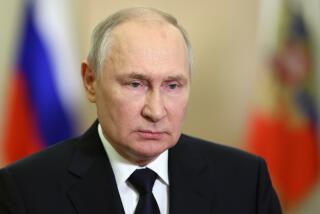More Russia Regions Seek New Powers : Politics: Several want status of federation republics. Efforts haunt Yeltsin’s Tokyo trip.
- Share via
MOSCOW — As he flew to the Tokyo summit Wednesday night, Russian President Boris N. Yeltsin left an ominous new trend mounting at home: moves among the sprawling federation’s regions to grab added power from Moscow and upgrade themselves to full-fledged Russian republics.
In the latest in a series of declarations, the Parliament of Russia’s Maritime province, which includes Vladivostok, is expected to vote today to launch a push toward turning its resource-rich strip of the Pacific Coast into a republic, with greater rights and lower taxes.
Such unilateral declarations, made just when Russia is trying to sort out its federal relations in a new constitution, are “untimely,” Yeltsin complained in a statement released Tuesday.
He asked that these actions be suspended until a special conference on the constitution resolves the issue and warned that they would “lead to a destabilization of power and a deepening of (Russia’s) crisis.”
The pattern of region after region claiming more control and demanding more economic independence is eerily reminiscent of the beginning of the collapse of the Soviet Union. Vice President Alexander V. Rutskoi warned this week that “The Vologda Republic, the Urals Republic--all this could trigger the disintegration of the Russian Federation.”
“There is an objective logic to disintegration,” the daily newspaper Komsomolskaya Pravda said Wednesday. “It is seen today in Russia, and it showed itself in the ex-Soviet Union.”
But the politicians engineering the push for more control insist that they are only trying to keep Russia together on acceptable terms.
“This movement is directed not at breaking up Russia but at helping the constitutional process from beneath,” said Ilya Grinchenko, a deputy in the Maritime province’s Parliament, in a phone interview.
Grinchenko even contended that by demanding to become republics, the upstart regions are actually helping Yeltsin in his fight to create a fair federal structure.
At the special conference to hammer out a new Russian constitution that opened in Moscow last month, the greatest battles have revolved around the status of the 88 chunks of territory that make up the Russian Federation.
Under the old Soviet system, 21 so-called autonomous republics, each created for an ethnic minority group, had the greatest rights and economic independence. Now, Yeltsin is trying to give more equality to regions and provinces, many of which are larger and more populous than the republics.
By declaring themselves republics, Grinchenko argued, regions strengthen Yeltsin’s arguments.
Yeltsin, however, does not appear grateful. Rather, he seems worried that by forcing the issue, the regions will derail the process of drafting the new constitution, which has become his primary short-term political goal.
And Igor Alexeyev, another deputy of the Maritime Parliament, worried that the expected declaration would make Yeltsin so angry that he might impose economic and other sanctions.
Yeltsin may have felt particularly slighted when his own home region of Sverdlovsk, around the Ural Mountains city of Yekaterinburg, declared itself the Urals Republic on July 1.
Until now, the rebellious Caucasus Mountains republic of Chechenya, which refuses altogether to acknowledge Russian rule, and the oil-rich republic of Tatarstan, which considers itself semi-independent, have led the challenge to Russia’s territorial integrity.
In recent weeks, however, Russian regions in the heart of the country, from Vologda to Krasnoyarsk, also have raised challenges to Moscow’s rule.
“It would seem the regions no longer want to await kindness from the center and are taking their fate into their own hands,” the government newspaper Rossiyskaya Gazeta said Wednesday.
For all their assertions that they are acting to help Yeltsin, the regions are also clearly seeking greater economic independence that will allow them to enjoy more of their own wealth rather than send it to Moscow for redistribution.
More to Read
Sign up for Essential California
The most important California stories and recommendations in your inbox every morning.
You may occasionally receive promotional content from the Los Angeles Times.













